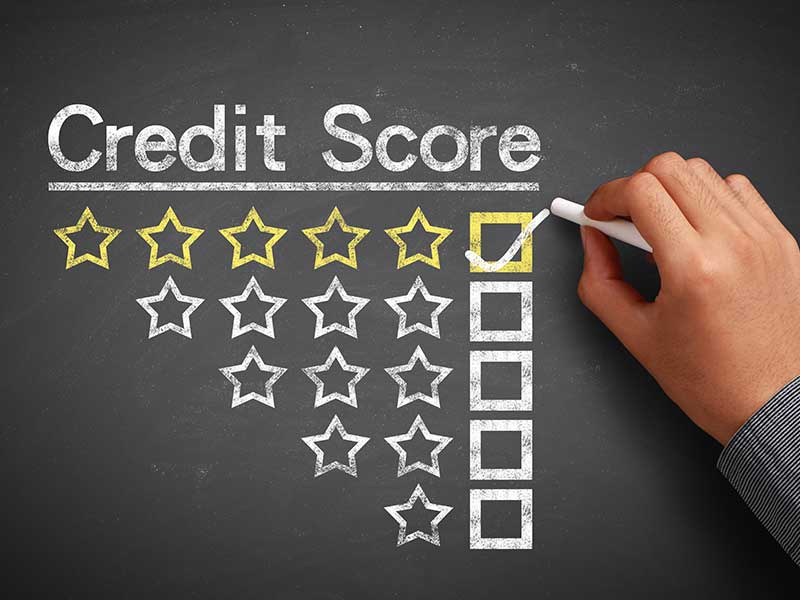Credit 101: credit reports and scores

Do you think that your credit score is only important when borrowing money? Guess again. Your credit score, and its accompanying credit report, is being evaluated not only when you want to take out a loan, but also when you apply for a credit card, get insurance for your car or home, rent an apartment, find a job and even to obtain some licenses. You may be wondering what is in your credit report and what makes up your credit score.
Your credit report
Your credit report contains your credit history – current and past loans and credit accounts. It includes the amount of loans or credit limits, balances, payment history, opened and closed dates, and names of creditors. Your credit report also lists any accounts in collection, liens, foreclosures, bankruptcies, civil suits and judgements. Finally, your credit report contains personal data such as your name, social security number, current and former addresses, birth date and phone numbers.
All this information on you and your credit history are reported by lending organizations (banks, credit unions, mortgage companies, debt collectors, and others) to credit reporting companies (also known as credit bureaus). Credit reporting companies also purchase public records such as bankruptcy filings and court records.
Check your credit report yearly
Once a year, you are entitled to get a free copy of your credit report from each of the three major credit reporting agencies, Equifax, Experian and TransUnion. You can order your free credit reports at AnnualCreditReport.com. You are given an option of ordering online, calling or ordering by mail.
Once you get your credit report(s), verify all your personal information such as name, address and social security number. Look at all the loans reported and make sure they are yours, and the data is accurate and complete. Particularly, look for:
- Closed accounts reported as open
- Accounts that you did not open
- Accounts incorrectly listed as late or not paid
- Same debt listed more than once
- Wrong name, address or phone number
- Accounts with incorrect balances or credit limit
If you see any information that is not correct, you can contact the business that opened the account or the credit reporting company that issued the report. The Consumer Financial Protection Bureau has more guidance on disputing information on credit reports.
Your credit score
The credit reporting companies use a mathematical algorithm to come up with a score that indicates how likely you are to pay back your debts and other obligations. Although there are a few different credit scoring models, the one used most is the FICO score (originally created by Fair, Isaac and Company). Consumer FICO scores range from 350 (the poorest score) to 850 (a most excellent score). According to myFICO.com, a credit score is generally calculated using these five major elements:
- How much you owe – 30%. Although not always, a high amount of debt might indicate you are over-extended and likely to miss or be late on a payment.
- Your payment history – 35%. Have you been making loan and credit card payments on time? That information is on there.
- Length of credit history – 15%. Longer credit histories usually increase your credit score. FICO looks at how long accounts have been established, and the average age of your credit accounts.
- Credit mix in use – 10%. FICO evaluates the mix of credit card, installment, mortgage, finance company and retail accounts. Although not a key factor, it becomes more important in the absence of other information.
- New credit – 10%. Opening several credit accounts in a short time span has been shown to indicate greater risk, especially for those without a long credit history.
The percentages in the above list are for the general population. For certain groups of people, for instance those who haven’t used credit before, these factors are calculated differently. Each individual factor can vary in importance, depending on the overall information in your credit report. It is not possible to measure the exact impact of any single factor.
Get your credit score
You will not get your credit score from your free credit reports. If you want to know what your credit score is, you can:
- Check your credit card or loan statement – often provided on a monthly basis. If you can’t find it on your statement, you can call any company you recently obtained credit from and they will tell you.
- You can also a contact a non-profit credit councilor, such as American Consumer Credit Counseling, who will provide you with your score and guidance.
- You can purchase your credit score directly from a credit reporting company, usually for under $10.
If you’ve never checked your credit report, it is probably time you did. It is also wise to check your credit report before applying for a mortgage loan, or if you’ve been denied credit, insurance, or a job because of your credit.
Contact Us
Call Center:
(575) 647-4500 or
Hours of Operation:
Monday thru Friday, 8 am-5 pm
Mailing Address:
P.O. Box 99
Las Cruces, NM 88004
Routing & Transit # 312276470
Federally Insured by NCUA
Your savings federally insured to at least $250,000 and backed by the full faith and credit of the U.S. Government. National Credit Union Administration, a U.S. Government Agency.
Equal Housing Lender
We do business in accordance with the Federal Fair Housing Law and the Equal Credit Opportunity Act.
White Sands Federal Credit Union is committed to providing a website that is accessible to the widest possible audience in accordance with the WCAG 2.0 standards and guidelines. We are actively working to increase accessibility and usability of our website to everyone. If you are using a screen reader or other assistive technology and are encountering problems using this website, please contact us at 575-647-4500 or 1-800-658-9933. Please provide the location of the inaccessible information. All products and services available on this website are available at all White Sands Credit Union branch locations.

